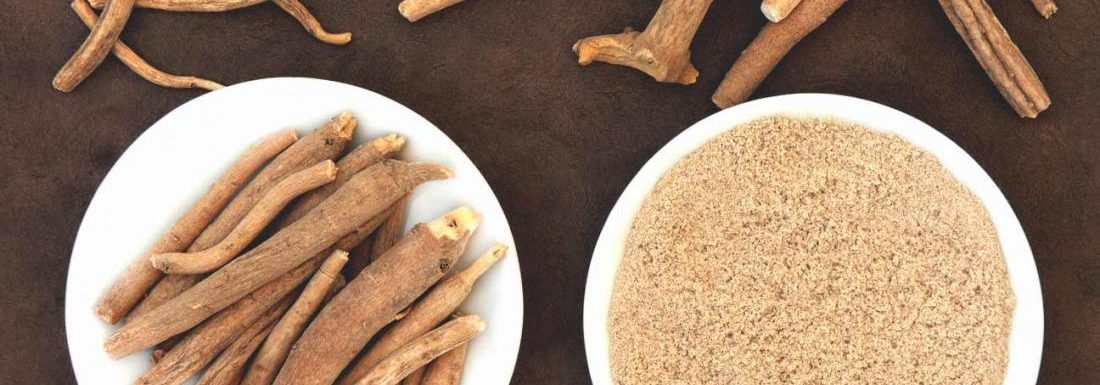Ashwagandha is a popular ancient adaptogen whose primary function is to help to manage stress. It’s been used for over 5000 years in eastern medicine, and can help improve body composition.
Ashwagandha can also help boost brain function, lower cortisol levels, reduce anxiety, and normalize blood pressure.
Below, we’ll explore the best Ashwagandha supplements, the benefits of this herb, and more.
Rankings
1. Nuzena Organic Ashwagandha+
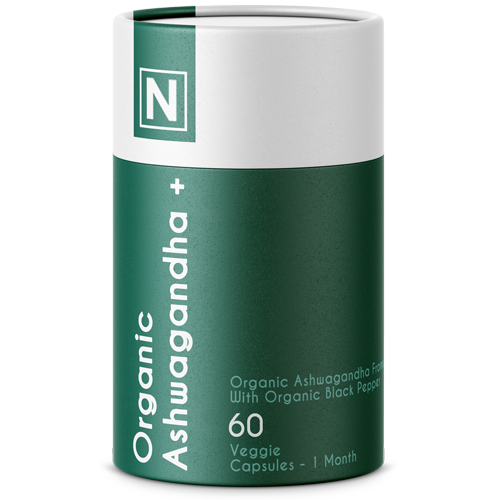
Nuzena’s Organic Ashwagandha is scientifically designed to treat stress, anxiety, and thyroid issues. Nuzena’s formulas are all third-party lab tested to ensure the highest quality.
What we liked: Nuzena’s clinically-proven formula uses only sustainable ingredients and go through rigorous testing for allergens and heavy metals. The dose is fairly average, but the added Bioperine drastically improves the potency.
Flaws: It’s expensive, but you get what you pay for. Our #1 pick of 2020.
2. Essential Elements Organic Ashwagandha
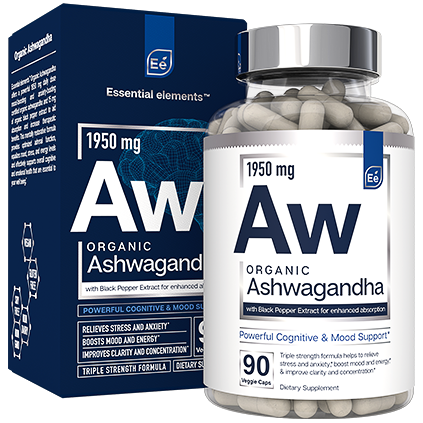
This triple-strength organic Ashwagandha by Essential Elements is one of our top picks because of its excellent price point and high-quality.
What we liked: Essential Elements Organic Ashwagandha is a powerful mood and cognitive booster. It’s combined with organic black pepper extract to improve absorption. It’s also free of gluten, GMOs, dairy and soy, and preservatives.
Flaws: This product may not be suitable for everyone, and there is a risk of allergy or adverse reaction.
3. Rootalive Organic Ashwagandha Root Powder
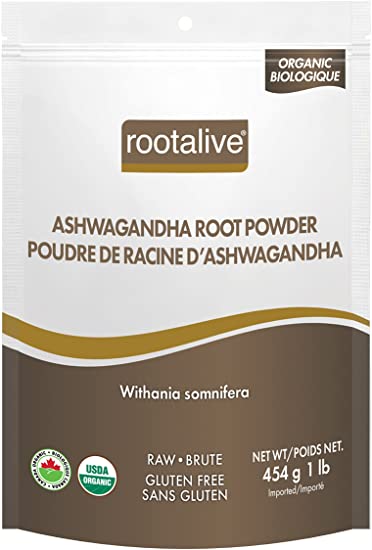
This certified organic, raw, and gluten-free Ashwagandha powder is an excellent alternative to the typical pill supplement.
What we liked: This product is a powder, so it’s an excellent solution for those who don’t want to or have trouble swallowing pills. Many customers mix the finely-milled powder into water or other beverages, like smoothies. You can easily tailor your dose as well with the included scooper.
Flaws: Some people will strongly dislike the flavor. This product also doesn’t travel well.
4. Himalaya Ashwagandha
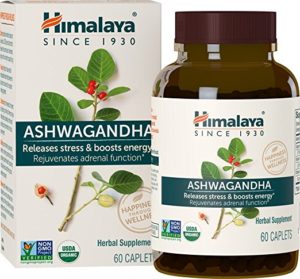
Himalaya provides a potent and pure Ashwagandha supplement that’s great for more advanced users.
What we liked: Himalaya uses a modern processing technology called supercritical carbon dioxide extraction. This helps to maximize the dose of active ingredients, providing a more powerful supplement with 670 mg per capsule.
Flaws: This is quite a potent supplement and may not be ideal for beginners.
5. Havasu Nutrition Ashwagandha
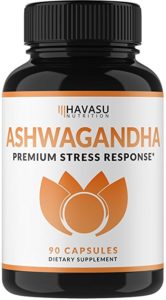
Havasu Nutrition provides a well-reviewed ashwagandha product that includes a moderate dose of Ashwagandha, along side other extracts to maximize the stress response.
What we liked: Havasu Nutrition steps up the game by including 50 mg of artichoke leaf alongside 500 mg of Ashwagandha in their gelatin capsules.
Flaws: Some people don’t like the combination of 2 different herbs combined. The gelatin capsule also makes this product non-suitable for vegans and vegetarians.
6. Nutra Herbals
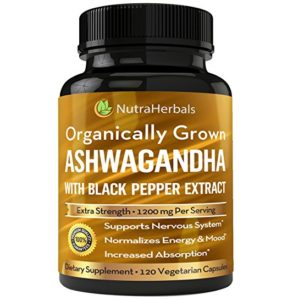
NutraHerbals provides one of the purest Ashwagandha supplements on the market, packed inside a vegan-friendly capsule.
What we liked: NutraHerbals provides a powerful dose of 600 mg of Ashwagandha root powder per capsule, alongside Bioperine for maximum bioavailability.
Flaws: Its high dose and improved bioavailability may be too much for people just starting out.
7. Organic India Ashwagandha
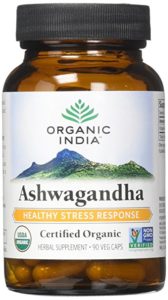
Organic India’s provides a good middle of the pack Ashwagandha best suited for purists and beginners.
What we liked: Organic India’s Ashwagandha is USDA-certified organic, which means there’s no trace pesticides or chemicals used in the plants.
Flaws: Its fairly low dose at just 400mg per capsule.
8. Vorst Ashwagandha
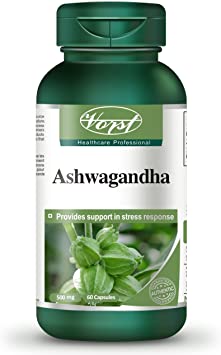
Vorst Ashwagandha is one of Amazon’s top-selling supplement products. Its affordable price point and excellent reviews make it a fantastic choice for new users.
What we liked: Vorst Ashwagandha is a Canadian-made supplement that is guaranteed authentic, made with premium ingredients, and GMP certified. It’s free of artificial additives, yeast, dairy, and gluten. Vorst has been making products since 1987, which shows this brand has excellent lasting-power and that many consumers continue to trust them
Flaws: The pills are 500mg, and the daily serving is 1000mg, so consumers have to take two pills. It’s also not certified vegan.
9. 88Herbs Premium Grade Ashwagandha
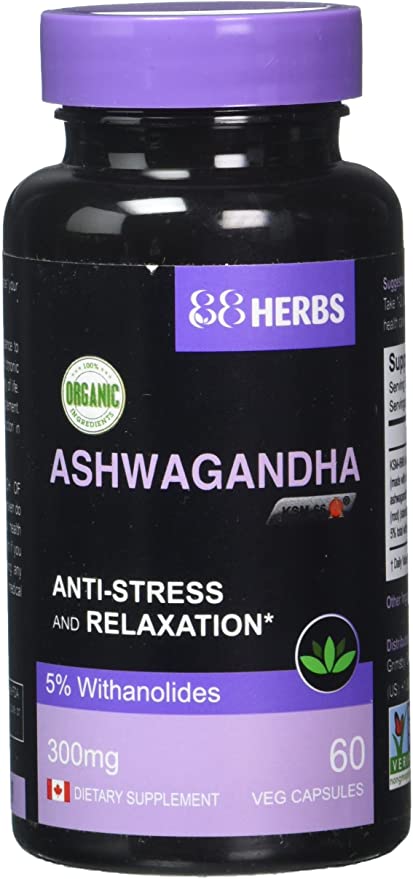
88Herbs Ashwagandha is vegetarian friendly and uses one of the most studied strains of the herb, KSM-66. Many customers raved about this product, and the price point is in the middle of the road.
What we liked: 88Herbs uses certified organic KSM-66 Ashwagandha which is premium-grade. It’s manufactured in a GMP facility and has zero unhealthy fillers.
Flaws: The dosage on these capsules is fairly low at just 300mg.
10. NOW Ashwagandha
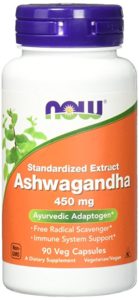
NOW supplements Ashwagandha is a fairly average Ayurvedic adaptogen, that comes at an affordable price for those on a budget.
What we liked: NOW provides a lower dosage of Ashwagandha per serving, at at 450 mg per capsule.
Flaws: There’s tons of additives and stabilizers included to maximize shelf life.
Who Should Buy Ashwagandha?
The benefits of Ashwagandha are outstanding, and many of them can be backed up by research and clinical trials. Ashwagandha has been used for centuries to help with concentration levels and increasing mental clarity (1). It’s believed that the high level of withanolides helps reduce inflammation and reduce tumor growth (2, 3).
It’s also been shown in studies to reduce blood sugar levels (4). This makes it an excellent option for reducing stress, managing body weight, and even building muscle. There’s a good reason that this herb has been used in medicine for over 5,000 years.
Ashwagandha appears to be safe for most individuals but may interfere with immunosuppressants and sedative medications. Pregnant women, diabetics, and people with thyroid issues should not take ashwagandha.
If you have any concerns, it’s always important to speak to your doctor before starting a supplement regimen with ashwagandha.
How We Ranked
The first thing we looked at when ranking the best Ashwagandha products on the market was the dosage and delivery method. On average, we wanted each product to provide at least 400mg per serving, as this allowed for easy dose tailoring and good value. Capsules were preferred, mainly because of dosage accuracy and taste. We did include powder-based products if they were of site quality, as in the case of Rootalive Organic Ashwagandha.
Next, we looked at the extraction process. There are a few ways to extract ashwagandha, with the best being supercritical carbon dioxide extraction. This method helps to maximize the dose of the active ingredients, providing a more powerful and pure supplement – a main reason why Himalaya ranked in our top 5.
Added ingredients were also important to consider. Products that contained a lot of filler sand stabilizers were either eliminated or ranked low, as in the case of NOW supplements. Supplements that included beneficial ingredients like BioPerine, which helps improve absorption, were rewarded accordingly.
Lastly, we looked at purity. Because ashwagandha is taken as a concentrated plant extract, we had a high preference for certified-organic products. This ensured we would get no pesticides or herbicides in our supplements, and was a main reason why our top choices like Essential Elements and Nuzena ranked so well.
FAQ
Q: Can you take Ashwagandha long term?
A: While the effects of taking Ashwagandha long-term are not really known, research suggests that taking it up to three months is the ideal time frame. Once the three months are surpassed, it could cause upset stomach, vomiting, and diarrhea.
Q: Is Ashwagandha safe for diabetics?
A: For those who want to use Ashwagandha to lower blood sugar levels, it could interfere with any prescription medication, so please consult your doctor before use. When combined, it could cause very low blood sugar, and if you’re diabetic, you should monitor your levels closely.
Q: Does Ashwagandha affect blood pressure?
A: When using the herb to impact blood pressure levels, it should not be used if you have low blood pressure, as it lowers it naturally. It can interfere with blood pressure medication, so use with caution and the supervision of a doctor. If you have stomach ulcers, the herb may impact the GI tract negatively, so do not use it if you have ulcers.
Q: Can Ashwagandha be taken by people with auto-immune disorders?
A: There is evidence to suggest ashwagandha may help in treating lupus (1). But most doctors will caution that if you have lupus, MS, rheumatoid arthritis, or numerous other diseases, Ashwagandha may amplify any symptoms felt by these diseases. It’s best to avoid using the herb in this case.
For those who suffer from thyroid issues, the herb may negatively impact hormone levels, so any hormonal medications could negatively interact with it.
Q: Can Ashwagandha be taken before surgery?
A: If you are about to have surgery or have recently had surgery, it’s best to avoid Ashwagandha at least two weeks prior, as it may slow down the nervous system, which could negatively impact anesthesia or other medications administered during surgery.
Q: Will Ashwagandha help my anxiety?
A: Ashwagandha is well-known for it’s mental health-boosting properties. Studies have shown that individuals see a positive impact on their anxiety levels (2), and possibly even depression.
However, everyone is different, and while this product may not work for you, speak to your doctor about other options. If you are currently on medication for anxiety or depression, Ashwagandha should not replace prescription medication.
Q: How soon will I see results with Ashwagandha?
A: Studies have shown that around the 30-day mark, you should see results. Ashwagandha is best taken for up to three months, as there is a lack of information on the effects of long-term usage. Consult your doctor if you want to exceed the three-month usage recommendation.
Q: Does Ashwagandha interact with other medications?
A: Immunosuppressants, benzodiazepines, CNS depressants, and thyroid medications are the most common and critical drugs that interact with Ashwagandha. In addition, CNS depressants, or sedatives should not be mixed including clonazepam (Klonopin), lorazepam (Ativan), phenobarbital (Donnatal), zolpidem (Ambien), and others.
Q: Can I take Ashwagandha with other supplements?
A: While there is no concrete evidence of other supplements interfering with Ashwagandha, it’s best to consult your doctor before introducing a new supplement into your routine, in case of adverse reaction.
Q: When should I take Ashwagandha?
A: It’s recommended that you should take Ashwagandha with meals. If you take the entire dosage at once, it’s best taken in the morning with food. If you spread it out throughout the day, ensure you take with food. Depending on what feels best for your body, lower dosages may feel better.
Q: Who shouldn’t take Ashwagandha?
A: Individuals who suffer from auto-immune diseases should not take the herb unless otherwise instructed by their physician. This includes MS, Lupus, type 1 diabetes, and more. Individuals who are on thyroid medications or hormonal medications should not take the herb unless specified by their doctor (3).
Individuals on blood pressure medication or insulin should discuss taking the supplement with their doctor to ensure dosages are correct.
Q: Is Ashwagandha okay to take while breastfeeding or pregnant?
A: To err on the side of caution, it’s not recommended for pregnant or breastfeeding women to take the herb. There is not enough scientific research behind this, but the herb has been linked to miscarriage in women. As the effects are not known, it’s best to avoid the herb during pregnancy or breastfeeding.
Q: What happens if I am allergic to Ashwagandha?
A: If you are sensitive to many foods or are allergic to nightshades, you may have trouble taking Ashwagandha. Individuals who are allergic to Ashwagandha may have a skin rash, difficulty breathing, shortness of breath, chest pain, gas, bloating, diarrhea, and itchiness as common side effects.
While these allergies are rare, if you are allergic to foods like tomato, potatoes, or peppers, they’re directly related to the herb.
Q: Does Ashwagandha help with sleep?
A: Ashwagandha helps reduce stress levels and improve sleep (4). Many consumers of Ashwagandha praise its ability to help them get more restful sleep and improved energy levels during the day. Due to the positive impact on the central nervous system, the herb impacts mental wellbeing on all levels, and that includes a more restful sleep.
Q: Is it safe to take Ashwagandha with alcohol?
A: Ashwagandha should not be taken with alcohol, as it already works to suppress the nervous system. The same way it should not be taken with sedatives, it can have an undesirable effect on the body. Ashwagandha has, however, shown early promise as a potential treatment for alcoholism (5).
Q: Is Ashwagandha great for skin?
A: There is not much scientific research for the effects of Ashwagandha on skincare, but it does have a high level of antioxidants and protects the body from free radicals, which can cause wrinkles and blemishes. The alkaloids that help with stress and anxiety may have a positive impact on the skin as well.
It has a positive impact on muscle growth, and body fat may result in improved skin. It works to improve reproductive health and hormone levels, which may help slow the aging process.
Q: Can children take Ashwagandha?
A: Ashwagandha has been shown to be safe for children and teenagers and promotes a variety of benefits for them. Children are building their immune systems, so the herb can provide a much-needed boost to protect them from the germs they come in constant contact with.
Like in adults, the herb can help reduce stress and anxiety in children and teens, resulting in better sleep and mental clarity. It can help improve focus and memory, which can be super beneficial through the school years. If your child struggles with food or a poor appetite, Ashwagandha may be able to help, as it regulates body weight while promoting strength.
Q: Can I take Ashwagandha daily?
A: Unless you are seeing undesirable side effects from taking too much Ashwagandha daily, it’s typically safe to take every day. The supplement should only be taken up to three months unless otherwise supervised by a doctor, as the long-term effects are not known.
Q: Is Ashwagandha keto-friendly?
A: Ashwagandha is keto-friendly, and many individuals on the keto diet swear by the supplement.
Q: I’ve seen many remedies that include putting Ashwagandha on my skin, are they safe?
A: There isn’t enough scientific research to support the benefits of putting Ashwagandha on the skin. The root extract must be taken orally in order to receive any skincare benefits, so you may experience skin irritation by putting it directly on your body.
If you have questions about this or are experiencing rashes or itchiness, please consult your doctor or pharmacist.
Related Articles
Recap
Overall, ashwagandha is an affordable way to boost your mental wellbeing, increase concentration, and reduce anxiety in those who don’t have underlying health conditions.
While the long-term impact of using ashwagandha is unknown, it’s typically safe for most people to use. We always recommend discussing your supplement regimen with your doctor before introducing a new supplement.
For CPOE.org’s #1 recommended Ashwagandha, click here.
